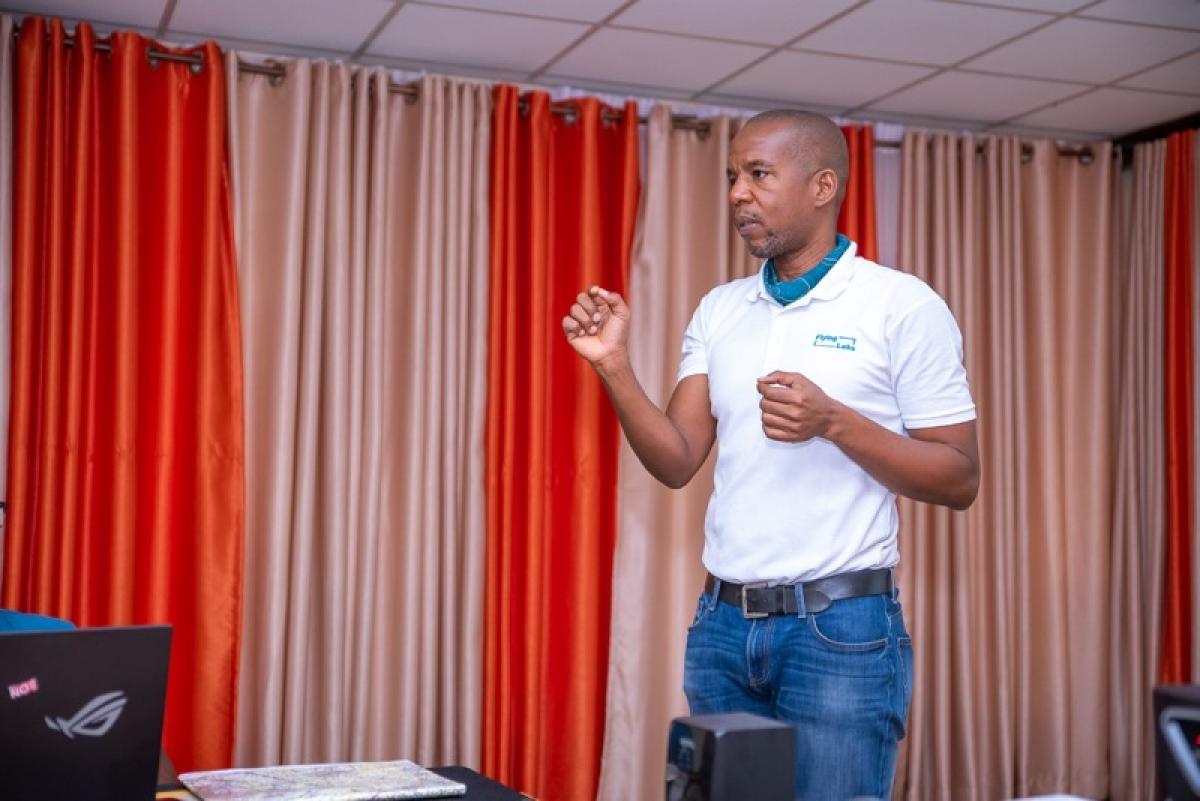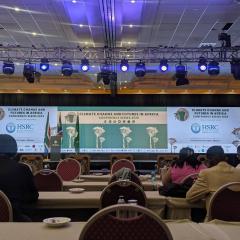
Building a Sustainable Ecosystem: Collaborative Growth in Tanzania’s Drone Industry
December 11th, 2023

A warm welcome back to our ongoing exploration of the drone industry in the Global South and how drone experts are leveraging the power of collaboration to achieve even more transformative change in their communities. In this installment, WeRobotics speaks with Leka Tingitana, Director of Tanzania Flying Labs. Our discussion delves into how the Tanzanian drone ecosystem is thriving and the vast opportunities available within it.
Leka's background is in technology transfer and social welfare. He is a certified Drone Pilot and Instructor interested in geospatial data and visualization. Leka is a Tanzanian Digital Changemaker with a Bachelor of Science in Electrical Engineering from the University of Houston and an MBA from the International University in Geneva.
We would like to get a sense of what the current drone industry in Tanzania looks like, and to get there, we want to start with your first experience with drones. What drew you to this field? And what differences do you see in the industry between now and when you started?
Regarding the civilian applications of drones, except for recent developments in the crop spraying sector, most of the work is in remote sensing and mapping. And it was like that then as it is now. That means the best candidates for these kinds of positions are geography-inclined people—GIS, geomatics, and the like. But I didn't enter the industry from that angle because I'm an Electrical Engineer. I approached it as a fantastic opportunity to participate in this new technology where we could fly these robots and build a career. I came into the industry from the excitement of experiencing something new and then quickly became a geospatial specialist.
Are you still utilizing electrical engineering in your work now?
Fortunately, they teach you programming in electrical engineering, from the basics to some of the more sophisticated programming software. So, learning how to use geospatial software is not really anything new. It might be a different syntax, but the principle is the same.
Did you face any challenges as you were getting into drones? And did you receive any specific kind of support that made it more accessible to you?
I got plenty of support from WeRobotics as I was starting out. Tanzania Flying Labs was one of the very first Flying Labs. The team was dedicated, and the support that I got was amazing.
Regarding challenges, I think I came into the industry at the perfect time. Straight off the bat, there was a natural disaster, flooding in Dar es Salaam, which necessitated using drones. And I just happened to be at the right place and time. From the beginning, the Tanzanian government has supported our efforts, and we have been working with the government to support disaster risk reduction and disaster response for many years now. I would say it's been a very pleasant experience so far.
Could you share some key examples of how Tanzania Flying Labs has deployed drones to address local challenges?
We have addressed several challenges, especially regarding disaster risk reduction and response. One example is when we provided data after the earthquakes in the Bukoba region in 2016. We have also worked hand in hand with the Dar es Salaam Multi-Agency Emergency Response Team in disaster risk reduction simulations. We have also worked with the Department of Antiquities in heritage conservation.
Heritage conservation is a really interesting space, especially when emerging technologies are brought in. It's like an intersection of the past and the future. Could you tell us more about that work?
It certainly is interesting, and it's something that I want to pursue more of. Next week, I'm going to be heading up to an area called Engaruka, which is very close to where some of the first footsteps of mankind originated. There was an ancient civilization in that area, and there's evidence of that ancient civilization—terracing and stone farms. We have done 3D mapping of the area before, and now I'm going to extract these features using drones, and we'll be using machine learning techniques. We'll be working with the Jomo Kenyatta University of Agriculture and Technology and are very excited about that. We have worked a lot with the data scientists and geospatial specialists of the future in our STEM programs, and we continue to do so.
That sounds like quite the story, and we hope you will tell it once you are through with the project. Building off that, would you say there's still a lot of opportunity within the Tanzanian drone space?
For pilots or companies coming up, big time! I was reading a recently published paper on the identification of water for larvae source management. And who knew, right? Suddenly, a new opportunity has popped up for drone pilots who specialize in that area. So essentially, you're an extension of the malaria control program, right? In fact, you could even take that further and not only identify these water catchment areas but also spray them with drones. And there are so many of these opportunities. For example, statistically, only 3 percent of the countries in sub-Saharan Africa have been professionally surveyed. On that alone, you could have work coming out of your ears because it's a vast region. You could be doing mapping for years.
I see plenty to go around for everybody, mainly when we specialize. You could be the coastal and marine mapping pilot and work with stakeholders specializing in critical habitat assessments. You could be the kind of pilot who wakes up every morning, and it's their job to map mangroves, or you could focus on the wildlife sector or on afforestation and reforestation. Even if a few players are already doing that, you could go do it somewhere else, or you can all collaborate because I have not seen anybody who can do all that work by themselves. There are so many things to do!
It's encouraging and inspiring to hear how the Tanzanian drone ecosystem thrives. What would you say the ecosystem needs to do even better now?
Really, from day one, Tanzania has been the drone capital of Africa; if you review the history and look at the work that has come out of this country. And we started it the right way. We didn't approach this with fear and tribulation. It was all heartily embraced by the Tanzanian government. We have worked hand in hand to ensure the safety of drone piloting in the lower skies in the country. We were the first to do internationally recognized pilot certification programs, and we still continue to do so—so much so that we have certified pilots from Kenya to Sierra Leone, all coming from Tanzanian instructors.
Regarding what could make things better, it has more to do with technicalities. I'm hinting at things like having a drone corridor similar to the one in Malawi. Additionally, having a properly formed drone association would benefit everybody. A few issues come to mind that would be good not just for a thriving ecosystem but for businesses looking to scale and grow. I'm hinting at topics such as taxation, incentives, and even high-speed internet access. Because there's no way to work in our field if you cannot transact big data. Are we providing computing power so that people can crunch these algorithms? That is a very limiting thing here. These are all things we can do to cultivate the ecosystem.
Based on everything you've shared, how do you see the industry evolving soon? Are there any changes happening right now whose effects we'll see in the next couple of years within the drone industry in Tanzania?
A few years ago, some of my former students wanted to go into crop spraying, which I hardly understood. I was slightly skeptical, and it now appears to be a booming industry. When you're trying to predict the future, something comes from your blind spot.
However, remote sensing and earth observation will not disappear anytime soon. So, if you are focused in those areas, I would say that you almost have a guaranteed career, even in the future, especially for someone specializing in machine learning artificial intelligence—you cannot lose. That's where it's going.
With tech, predicting what will happen is difficult because of how rapidly things change. You could think that the big thing right now will still be the big thing two years from now, then the technology will leap forward, and suddenly, you'll be kind of obsolete. So again, the constant is the analytics, being a creative person who can make sense of the data that can assist a policymaker in making informed decisions. That is where we have a gap. Those people are few and far between, so that's where you want to be.
That's helpful insight for any young person who wants to enter this field. For our final question, let's talk about the Global Flying Labs Network, which is all about cross-border collaboration. What role do you think these kinds of collaboration play in furthering drone technology's adoption and impact in the global south?
As an example, Kenya Flying Labs was certified in Tanzania. And look at what Kenya Flying Labs has become now – it's a success story. We also trained pilots in Cote d'Ivoire on flying fixed-wing aircraft. They, in turn, help us with agronomy because we're not agronomists, and they are. So, there is so much knowledge exchange that happens within this Network. And it's great that it extends beyond the continent. We have collaborated with Nepal and Fiji, for example. There have been so many positive and collaborative interactions, and it's because we have the same goals. And so far, it's been a beautiful thing.
Thank you so much, Leka. Your time and insights have been a great gift.

Through its contributions to disaster response, heritage conservation, and STEM programs, among other sectors, Tanzania Flying Labs continually demonstrates the versatility of drone technology. Our local expert's insights into the plethora of untapped opportunities within the Tanzanian drone space and the future evolution of the industry leave us inspired and eager to witness what comes next.
Join us in our next installment as we speak to Namibia Flying Labs.
Recent Articles

